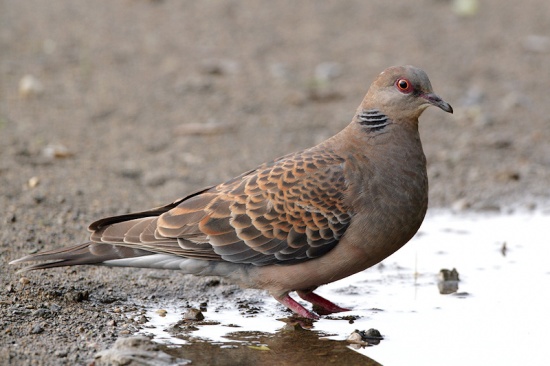Alternative name: Rufous Turtle Dove
- Streptopelia orientalis
Identification

Photo © by Alok Tewari
Bhimashankar WLS, Western Ghats, Dist. Pune, Maharashtra, India, 24 January 2016
33–35 cm (13-14 inches)
- Scaly buff-brown on back and wings (the feathers are black fringed with buff, grey, or red
- Black and white neck patches
- Long, grey, white-tipped tail
- Red eyes and pink legs
Sexes are similar but juveniles are paler and lack the distinctive neck patches.
Similar species
European Turtle Dove is similar but has black (not dark gray) centers to the mantle feathers and broader rusty fringing to the greater and median coverts. Spotted Dove has similar neck pattern but lacks rusty mantle fringes and has different vocalisations.
Distribution
Asia: found in Siberia, Iran, India, China, Korea, south-east Asia, and Japan. Vagrants to to Alaska, Canada, California and Western Europe. Some records may be escaped captives.
Taxonomy
Subspecies

Photo © by Alok Tewari
Kainchi Ashram, Dist. Nainital, Uttarakhand Himalayas, India, 21 April 2015
There are six subspecies generally recognised[1]:
- S. o. meena:
- South-western Siberia to Iran, Afghanistan, Kashmir and Nepal
- S. o. orientalis:
- S. o. stimpsoni :
- Ryukyu Islands
- S. o. orii:
- S. o. erythrocephala:
- Peninsula India
- S. o. agricola:
Habitat
Forests and light woodland, city parks and gardens.
Behaviour
Diet
Forages on the ground, sometimes in rice paddies. Their diet is mostly vegetarian, consisting of cereals and pine seeds, also shoots of various plants, including bamboo and herbs.
Breeding
The clutch consists of two white eggs which are laid in a twiggy tree nest.
Movements
Populations of northern Asia from Siberia to Japan and Kurile Islands migrate south to winter in southern and eastern Asia from India to southern Japan. Otherwise resident.
Vocalisations
Typical call is a four-note croo croo-croo crooo. Himalayan populations vocalisations are said to differ substantially from north Asian populations suggesting that more than one species may be involved.
References
- Clements, J. F., T. S. Schulenberg, M. J. Iliff, D. Roberson, T. A. Fredericks, B. L. Sullivan, and C. L. Wood. 2018. The eBird/Clements checklist of birds of the world: v2018. Downloaded from http://www.birds.cornell.edu/clementschecklist/download/
- Birdforum thread discussing identification of European Turtle-Dove vs meena Oriental Turtle-Dove
- Avibase
- Wikipedia contributors. (2018, March 23). Oriental turtle dove. In Wikipedia, The Free Encyclopedia. Retrieved 09:12, February 1, 2019, from https://en.wikipedia.org/w/index.php?title=Oriental_turtle_dove&oldid=832097693
- Baptista, L.F., Trail, P.W., Horblit, H.M. & Boesman, P. (2017). Oriental Turtle-dove (Streptopelia orientalis). In: del Hoyo, J., Elliott, A., Sargatal, J., Christie, D.A. & de Juana, E. (eds.). Handbook of the Birds of the World Alive. Lynx Edicions, Barcelona. (retrieved from http://www.hbw.com/node/54152 on 7 June 2017)
Recommended Citation
- BirdForum Opus contributors. (2025) Oriental Turtle Dove. In: BirdForum, the forum for wild birds and birding. Retrieved 11 May 2025 from https://www.birdforum.net/opus/Oriental_Turtle_Dove
External Links
GSearch checked for 2020 platform.1






